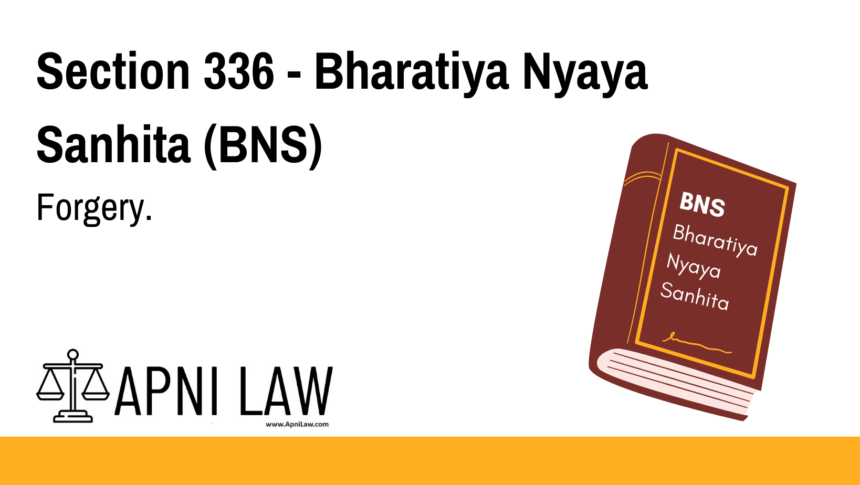Code: Section 336 BNSS
(1) Whoever makes any false document or false electronic record or part of a
document or electronic record, with intent to cause damage or injury, to the public or to any
person, or to support any claim or title, or to cause any person to part with property, or to
enter into any express or implied contract, or with intent to commit fraud or that fraud may be
committed, commits forgery.
(2) Whoever commits forgery shall be punished with imprisonment of either description
for a term which may extend to two years, or with fine, or with both.
(3) Whoever commits forgery, intending that the document or electronic record forged
shall be used for the purpose of cheating, shall be punished with imprisonment of either
description for a term which may extend to seven years, and shall also be liable to fine.
(4) Whoever commits forgery, intending that the document or electronic record forged
shall harm the reputation of any party, or knowing that it is likely to be used for that purpose,
shall be punished with imprisonment of either description for a term which may extend to
three years, and shall also be liable to fine.
Explanation of Section 336 BNSS
Section 336 criminalizes forgery, which involves making false documents or electronic records with the intention to deceive, cause harm, or commit fraud. The section defines the intent behind the act, which differentiates simple forgery from more severe offenses like cheating or defamation.
- Section 336(1) focuses on the act of forgery and the intended purpose behind it.
- Section 336(2) deals with the general punishment for forgery.
- Section 336(3) imposes harsher penalties if the forged document is intended to be used for cheating.
- Section 336(4) covers cases where the forgery is intended to damage a person’s reputation, with a separate penalty structure.
Illustrations
- Forgery for Financial Gain:
- Example: A forges a bank statement to show higher account balances to secure a loan.
- Outcome: A commits forgery under Section 336(1), punishable with up to 2 years of imprisonment or a fine.
- Forgery Leading to Cheating:
- Example: A forges a certificate claiming to have a degree they do not possess to secure a job.
- Outcome: A commits forgery with intent to cheat, punishable with up to 7 years of imprisonment and a fine.
- Forgery to Damage Reputation:
- Example: A creates a fake letter claiming that B is involved in criminal activities and spreads it publicly.
- Outcome: A commits forgery with intent to harm reputation, punishable with up to 3 years of imprisonment and a fine.
- Property Dispute Forgery:
- Example: A forges a sale deed to claim ownership of a property that belongs to C.
- Outcome: A commits forgery to support a false claim of title.
- Forgery in Contracts:
- Example: A forges a contract agreement with Z to claim payment fraudulently.
- Outcome: A commits forgery under Section 336(1) to induce financial benefit.
Common Questions and Answers
1. What constitutes forgery under Section 336?
Forgery includes making, altering, or using a false document or electronic record with intent to deceive, cause harm, or commit fraud.
2. What is the difference between forgery and cheating?
- Forgery is the act of creating or altering documents dishonestly.
- Cheating involves deceiving someone to gain unfair advantages, often using forged documents.
3. What are the punishments for forgery?
- General forgery: Up to 2 years imprisonment, fine, or both.
- Forgery for cheating: Up to 7 years imprisonment and a fine.
- Forgery harming reputation: Up to 3 years imprisonment and a fine.
4. Can forgery be committed without financial gain?
Yes, forgery can occur even if no financial gain is intended, as long as there’s an intention to deceive or harm someone.
5. Does digital forgery fall under Section 336?
Yes, Section 336 applies to both physical documents and electronic records, as per the Information Technology Act, 2000.
Conclusion
Section 336 of the Bharatiya Nyaya Sanhita (BNS) is a comprehensive provision addressing the crime of forgery. It covers both traditional and digital frauds, with specific penalties based on the intent—whether for financial gain, cheating, or reputational harm. The section reinforces the importance of honesty in legal, financial, and personal dealings, ensuring that individuals and organizations are protected from fraudulent activities.
This provision highlights the legal consequences of dishonest practices, promoting transparency and trust in all transactions.








